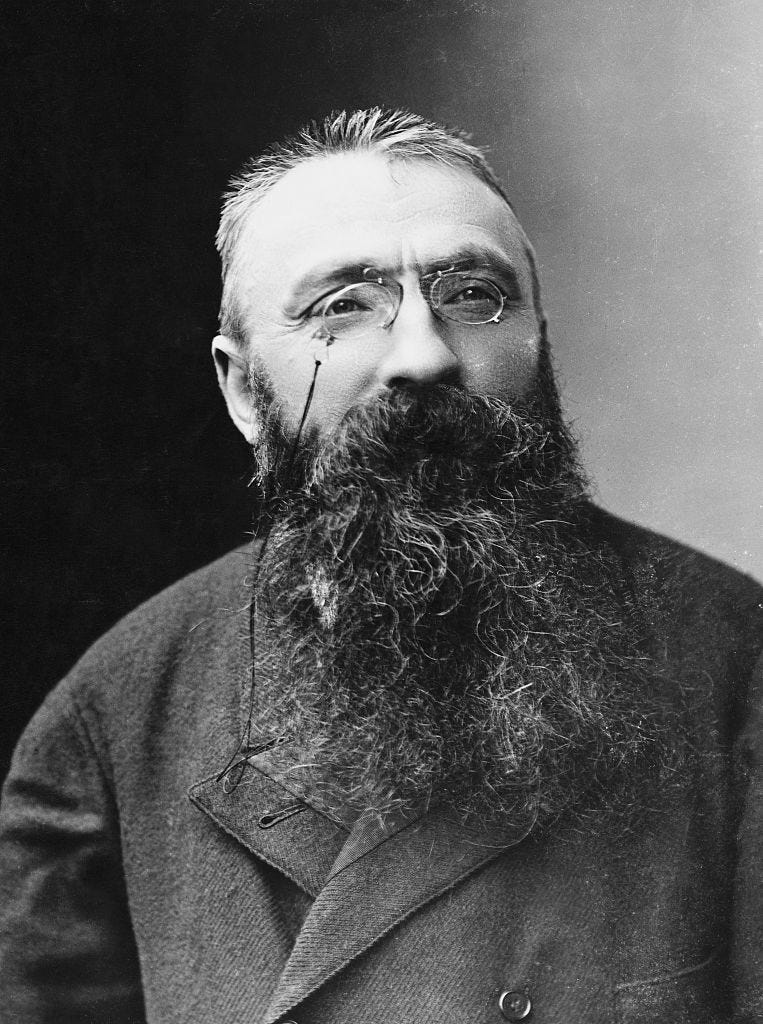Q.
Dear George,
Thank you so much for Story Club, and for your own writing, from which I draw great inspiration and solace. I am struggling with a problem I haven't encountered before that I am hoping you (and the good people of this community) can help with.
I have been working all year on a short story that I think has the potential to be very compelling. After months of toying with the central character and what he could do about his problem, I felt the story begin to crystallize-- that is, I cut all the stuff that wasn't working and rearranged a bunch of what was, and for the first time felt I was working on something coherent, rather than a pile of paragraphs.
I hosted an Iowa-style fiction workshop for my writing group in July, and decided I would submit this piece for feedback. For weeks in advance, I combed through the story, tweaking the sentences to better suit my personal taste, in what I might call the Saunders Method of editing. Finally, I submitted the story to my peers-- and got back rave reviews. They gave helpful insights and plenty of praise. It was everything I had hoped for. I then dutifully put the piece aside for a few months to ensure I could come back to it with fresh eyes and an open mind.
Well, last week, I finally did-- and the story is bad. It doesn't intrigue or inspire me. I don't care about my main character or his problem. The pacing feels awkward, the dialogue clunky. The most emotionally resonant moments don't make sense, plot-wise, for the characters having them. And the (first-person) narrator just sounds like me, rather than like a specific guy. I fear I just polished the piece for so long that I deluded myself into thinking the whole story was "good." I was trimming each tree rather than shaping the forest as a whole, and now I'm realizing the forest is a mess.
I expressed this to my writing group, and they say I'm crazy. They're all telling me not to overhaul my great (to them) story in the way I'm so tempted to do. So I'm left wondering: Can I trust my own (negative) reaction to a story I've been so close to for so long? What if I get through the structural edits I'm embarking on now, and I still don't like it? Will I be stuck re-editing this thing forever?
Thank you for taking the time to read this question, and I hope it can offer a little solidarity to others who may be experiencing similar frustrations.
A.
Wow, was this ever a question that seemed to come from deep inside my own mind.
Let me blurt out the first answer that (strongly) came to me, which would be: Put it away for a few months, go work on something else, and then come back to it. That is, don’t entirely trust the person you were when you loved it, or the person you are now, who can’t stand it, and also don’t entirely trust your writing group. Trust the person you’ll be in a few months. She will have the advantage, at least, of being able to read it anew, keeping clear of the current back-and-forth you’re engaged in, which might (might?) involve some level of reaction to the writing group’s enthusiasm, if you see what I mean. (As soon as someone praises something of mine, the inner Catholic in me starts wanting to tear the thing apart.)
Will that future you be entirely right? No, and that’s the pisser of this particular art form and maybe all forms: the judging mind moves around. It likes something today but finds it just “meh” tomorrow. Something we’ve been meaning to change for weeks will suddenly seem just right. A stunning work of art destined to last for the ages suddenly proves impossible for its own author to get through.
What we can do, I think, is include this whole deal as part of our “process.” At the beginning of a writing day, for example, as I’ve just started to re-read my story, I’m already looking over sideways at the reading mind, to see what sort of mood it’s in.
Sometimes I feel myself reading in a nice neutral state, with a high degree of reception (I’m really feeling the story, as it corners). Other times, I’m halfway through the first page before any kind of reception kicks in.
So…I’m a little more bold about making changes on the former sort of day, and more cautious on the latter.
Some days, I’m elated with what I’ve done; other days, that same passage seems entirely made up of lumps and cliches, and I can’t believe I was ever fond of it.
So, part of the job, I think, is to recognize that, in addition to having many writers within us, we also have many readers within us. We have an internal reading committee, and different members show up on different days, in different moods.
This is part of why I so value iteration – going through a story over and over. I’m essentially letting a bunch of different versions of “me” to the table, over those days and weeks of working, and the story, being revised by each one of those versions, is changing in response, and the result, ideally, is more “me” (more completely, inclusively me, incorporating all the things I’ve done and known, and all my different modes of persuading, charming, narrating, etc.)
That’s the hope, anyway.
Which, of course, raises the big question: how, then, is a story ever done? That is, couldn’t a person just revise infinitely, responding every day to whatever version of himself shows up?
And as we all know, the answer is, yes, a person sure could and a person often does.
This was especially true for me when I was younger and newer at writing – I’d chase the story around, changing and rechanging it, and then I’d finally give up on it and start a new one, one that would, I hoped, sit still awhile so I could finish it. In those days, I think I was suffering from the lack of a coherent, strongly felt, esthetic sense – I didn’t know what I was looking for, exactly.
But now, after all these years of working, things feel different.
Now, although there is still frustration and doubt all along the way, I have a sort of background faith that if I just keep working at it, in time, the thing will stabilize. Over the long-haul, I’ll be making fewer changes. Certain choices, having been made, will stick. What was good will stay good; there will be (sure, yes,) some lingering, iffy, blurry, to-be-determined places, but these will gradually diminish in number until there are just two or three; the story will start to tell me more clearly what it’s about, and so on.
I still wouldn’t say I have a solid esthetic sense that I could pithily summarize but I feel, more, now, that I know “good” when I see it.
And by not changing the places that seem “good,” and being willing to try something new at the places that don’t seem “good”…gradually, gradually, the whole thing settles down until finally, in the end, I can read through it without objection (and even some joy).
A colleague of mine at Syracuse, Michael Burkard (a wonderful poet and teacher), tells this story: One day he was cleaning out a desk in his office that, over the years, had filled up with student manuscripts and correspondence and so on. He pulled out a student manuscript, started to read it, and was impressed. Really impressed. These were really good poems. Wow. Then he looked to see who the author was, and it was….him.
And it all came back: this was a book he’d been working on five or ten years ago, that he’d despaired of and abandoned and entirely forgotten about.
He read it through to the end, liking it and making very few changes, then sent it off to his editor – who immediately accepted it for publication.
And that book is Pennsylvania Collection Agency.
So, one thing we want to get in touch with is our relation to our own sense of judgment. How constant is it? How does it behave, in its variations? Can we be aware, on a given day, of how reliable our (very real and, at the time, undeniable-feeling) reaction is?
All of this points to a sort of writing super-virtue, which is: patience.
And, I’d say, happy patience or, you know, hopeful, interested patience. There’s a strange new egg sitting there and we don’t know what kind of creature it holds or how long the gestation period is but….well, it’s definitely an egg.
So, we wait.
In the case of a story, of course, we are doing things while we wait, things designed to help. We’re re-reading and revising, we’re thinking about the thing, we’re letting our subconscious mind engage with it in that mysterious way in which the subconscious does.
But, above all, we’re giving it time, in a spirit of hope – sometimes it’s an exasperated hope (“Will you please just decide what story you are?”) and sometimes there might even be a little pity in it (“Oh, you poor story, you’re trying so hard. Don’t worry, I’m here for you, and I believe in you.”)
I have, above my desk, this Rodin quote, to help me in moments when I feel I’m making no progress/floundering/lost forever:
“Patience, too, is an exertion of energy.”
Thoughts on this, Story Club?









Here's my "let it rest" case for today. In 1974 I created a collection of short pieces (poems, mythology, historical fiction, etc) which I call my first novel. Which it was not in any way. I sent a copy to poet Robert Bly and asked him to tell me what he thought. Why him? Not sure. Maybe I had just finished reading one of his collections. Who can remember his motivations fifty years ago. He replied a couple months later with a mixed review. He like the narrative parts, but the dialog was, as he put it, "pious goo." That was all I needed to throw the thing in a box and try to forget about it. For 46 years I carried it in my box of relics from house to house until in 2020 during Covid lock-down, my wife asked, "What is in that box under the bed?" Pulling out the box and opening it, I found the rejected manuscript, read it and liked parts of it. Dislike other parts. There was potential there; and now, after three years of work, it sits with my publisher waiting to be released as a novel. So, let it be. But don't give up.
I had a similar and relevant experience somewhat recently. I first wrote the story I have in mind around 2017 or 2018, brought it into a workshop, made revisions from that feedback and periodically for a couple of years until I thought it was done. I submitted it a few times, resulting in the usual form rejections. At some point, I think in the first year or so of Story Club, I read through and thought it was stale and stiff and that if it was to live any longer, I needed to completely rework it. But I was working on other things at the time and sort of forgot about it. Last spring I got it out, read it, and thought, hold on, I like this as it is! I decided to submit it once more even though it was over the word count of the particular journal. Lo and behold, they accepted it, and, unless things have changed without me knowing, it should be coming out in the fall issue. This is a very small journal, and yet a beautifully designed one, and I'm thrilled that it will find a home there. So, I guess that's all to say that this happened to me, and I did what George said and set it aside, and myself a year later or so decided it was worthy. And then, amazingly, even someone besides me did, too.